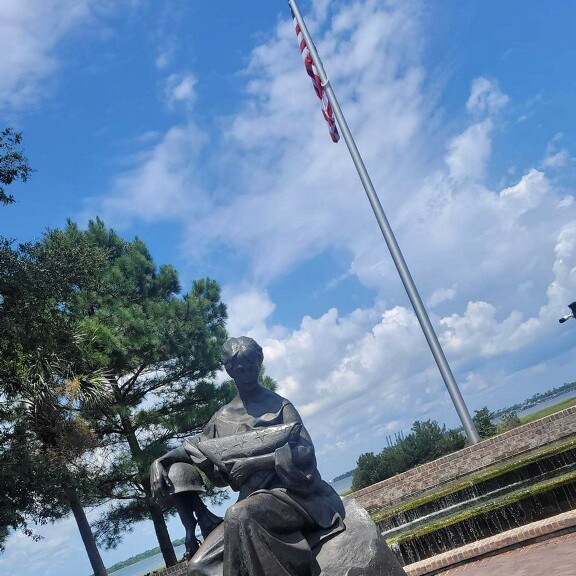STATEHOUSE REPORT | ISSUE 21.30 | JULY 29, 2022
BIG STORY: How abortion now works in South Carolina
NEWS BRIEFS: Big Mega Millions jackpot drawing is tonight
LOWCOUNTRY, Ariail: Raise your … hooves
COMMENTARY, Brack: S.C. Senate is poking free speech bear on abortion
SPOTLIGHT: The S.C. Education Association
FEEDBACK: Great column on old family photo
MYSTERY PHOTO: Tilted shot of statue
How abortion now works in South Carolina

By Samantha Connors | Since the U.S. Supreme Court overturned Roe vs. Wade June 24, state abortion laws, particularly in red, Southern states, changed rapidly. In South Carolina, for example, the ruling triggered a 6-week “fetal heartbeat” abortion ban and now, some lawmakers want a total ban.
“The laws are designed to be very difficult for people to understand,” said a North Carolina staffer at the two-state Carolina Abortion Fund (CAF) who wanted to be on record simply as Justine.
Right now, abortion is still legal in South Carolina, though procedures can only be performed when no fetal cardiac activity is detected, which typically begins around six weeks of pregnancy.

“Six weeks is when most people don’t even realize they’re pregnant,” said Columbia’s Vicki Ringer, director of public affairs for Planned Parenthood South Atlantic. “They’re late by two weeks, and for many women, depending on birth control methods, they may not have periods at all.”
Many factors can cause menstrual periods to stop or become irregular — birth control methods, high levels of exercise, taking certain medications — all of which make it difficult to suspect pregnancy at six weeks.
“The law says that every woman who wants an abortion has to have an ultrasound, even though it is not medically required for an abortion at an early stage of pregnacy,” said Ringer. “At six weeks, you can generally hear fetal cardiac activity through the use of a trans-vaginal ultrasound, but at six weeks, there is no heart. There are no chambers. What you’re looking at is an embryo that has no measurable weight – you can’t even say that it weighs an ounce.”
But according to current South Carolina law, an abortion would be prohibited at this point. Because of this accelerated time limit and short time frame today, women’s reproductive health professionals generally recommend women seek care as soon as they suspect pregnancy, sources say.
“In the past, we had people taking a little more time to raise the money that they’ve needed to pay for an abortion. You know $500 is just not something most people have as disposable cash,” said Ringer. “Nowadays, we tell people don’t wait until you’ve raised the money. We have abortion funds. We have amazing donors who have stepped up so that they can help these women get care earlier.”
If you think you may want an abortion now
South Carolinians seeking abortion care are advised to contact Planned Parenthood South Atlantic or women’s health clinics as soon as they suspect pregnancy. The health care provider will determine if the woman is eligible for an abortion in South Carolina. If not, they can help make an appointment in North Carolina, where laws permit abortion up to 20 weeks, arrange travel logistics and help with cost.
 After making an appointment, women can also contact Carolina Abortion Fund, which serves North Carolina and South Carolina. The organization aids women seeking abortion care by helping with the finanical cost of the procedure and travel.
After making an appointment, women can also contact Carolina Abortion Fund, which serves North Carolina and South Carolina. The organization aids women seeking abortion care by helping with the finanical cost of the procedure and travel.
“We have an active transportation network,” said Justine. “We’ll give people money for Uber; give people gas money. We’ll do everything we can to try and help them.”
But for many women, traveling for a procedure is still unfeasible. North Carolina law requires a 72-hour waiting period between meeting with a health care provider and receiving care. This law is intended to deter women from abortion as providers are required to present patients with state-directed materials discouraging abortion.
As a result, South Carolinians traveling to North Carolina for health care must spend at least three days there. Aside from the cost of the procedure and travel, women must also take time off of work and find child care if they already have children.
South Carolina has a similar statute, requiring 24 hours between the presentation of materials about abortion and an abortion appointment.
One woman’s experience
A North Charleston resident this week spoke to Statehouse Report about her experience seeking an abortion in South Carolina seven years ago. Even then under the protection of the Roe precedent, South Carolina law still required providers to show state-directed materials.
“When I went for my appointment, they brought me into a room with all these other girls that are getting one and had us watch these videos about the life process,” she said. “It was a legal thing. They were legally required to try to talk you out of it basically.
She said the experience felt incredibly patronizing.
“Everybody in that room has thought about every single option that they possibly could probably 8 million times before they ended up there. And you don’t have any privacy during it. You don’t have a choice.
“There’s not another medical procedure in the world that makes you do that.”
“Plan C”

What happens now for South Carolina women who are past the 6-week mark and who are unable to travel? Legally, there are no more options in South Carolina to terminate a pregnancy. But some women are turning to Plan C.
“Plan C” is a term for medication abortion, also known as the abortion pill, which is the preferred abortion method. About 60% of abortions are performed with medication, according to Ringer. But using or possessing the two abortion medications — mifepristone and misoprostol — is illegal in South Carolina past six weeks.
When a medication abortion is provided, the patient typically takes the first pill at a health care center and then takes a second pill at home. Telehealth visits for abortion care are illegal in North and South Carolina, though the FDA considers receiving abortion medication via telehealth completely safe, said Ringer.
Women who are traveling to North Carolina for abortions are eligible to receive a medication abortion under North Carolina Law, but traveling back into South Carolina with the medication does put patients at the risk of being criminally prosecuted.
“You could be charged with a crime and go to jail for just possessing [those two drugs],” said Ringer. “If you had them and you tried to sell them to others, that would be a crime. You’d have harsher criminal penalties for possessing those pills than you would if you had pounds and pounds of hard drugs that you were distributing.”
Though it is illegal, many women feel they are in a dire situation and are choosing to order these pills online. Because of medical advancements, the days of “coat hanger abortions” are gone, many abortion advocates say, and illegally obtaining abortion medication is a much safer option for an unlawful abortion. Abortion medication is considered safer than Tylenol and Ibuprofen.
A platform called PlanC.org provides information on obtaining abortion medication in the U.S. and through online, international pharmacies. There are risks to ordering these pills online: They are not FDA approved and obtaining them is considered illegal in South Carolina. PlanC.org orders and tests pills from the recommended sites but cannot guarantee reliability in the future according to PlanC.org.
Opting to have a self-managed abortion (or an at-home abortion with no medical professional) has risks if medical complications arise or an incomplete abortion occurs, said Justine.
“I was scared”
This was the case for the North Charleston woman who shared her story above. After receiving a medication abortion, a blockage occured in her uterus, causing extreme bleeding as her body tried to rid itself of the fetal tissue but could not. This required extra medical attention and a surgical procedure.
“I was scared. I didn’t know what to do,” she said. “I can’t even imagine if that happened to me today because I had that option at the time to, no matter how scared I was, to still go back to the doctor. Today, if the language of the legislature says it is illegal to perform an abortion after six weeks, the second procedure I had, is that legal?”
Though it is rare, this scenario is one of many playing out in health care centers and hospitals across the state. Complications with abortions and wanted pregnancies are leaving doctors confused and unable to act in the patients’ best interest at the risk of losing their license, getting sued or even being criminally prosecuted.
With Senate bill S.1373 currently in committee in the state Senate seeking to ban all abortions without exceptions for rape, incest or medical emergencies, the situation for women may become even more difficult.
“I think that being forced to carry a pregnancy you do not want to carry is cruel, unusual punishment,” said Justine.
Ringer added, “The most extreme legislators don’t believe there should be exceptions for rape or incest. They have limited the exemptions for women’s health. A woman must be near death before she can get an abortion and there are situations where there can never be a viable pregnancy.
“[In some situations] women are being force to, instead of having an abortion, they must go through labor and delivery of a dead fetus. It is terrible. It’s cruel at the basic level, but women are suffering because doctors’ hands are tied.”
Samantha Connors is an editor at the Charleston City Paper, a sister publication of Statehouse Report. Have a comment? Send to: feedback@statehousereport.com
Big Mega Millions jackpot drawing is tonight

Staff reports | The Mega Millions lottery jackpot is $1 billion today. If you win during this evening’s drawing, you could take home a fat check of more than $600 million. (What would you do with all of that money, anyway?)
South Carolinians reportedly went into overdrive this week ahead of the drawing for the Mega Millions lottery. This is the fourth billion-dollar lottery prize in U.S. history. You have a one in 302.6 million chance of winning the jackpot.
In other headlines:
![]() S.C. fetal heartbeat abortion ban remians in place. A state circuit judge on Tuesday denied a request by reproductive health supporters to temporarily block a six-week abortion ban request and asked that the case head to the state Supreme Court. In what is expected to become a protracted legal battle, the ruling allows the state to continue to enforce the abortion ban. A lawsuit challenging the ban argues that it violates the state constitution’s rights to privacy and equal protection.
S.C. fetal heartbeat abortion ban remians in place. A state circuit judge on Tuesday denied a request by reproductive health supporters to temporarily block a six-week abortion ban request and asked that the case head to the state Supreme Court. In what is expected to become a protracted legal battle, the ruling allows the state to continue to enforce the abortion ban. A lawsuit challenging the ban argues that it violates the state constitution’s rights to privacy and equal protection.
S.C. has 16,570 new Covid cases, 9 deaths. South Carolina had an increase of more than 2,800 new cases of Covid-19 than last week, state officials reported today. Over the last week, nine people died from the virus. In related news, South Carolina now has 14 cases of monkeypox.
S.C. challenges Biden’s proposed gun reform bill. South Carolina joined a 17-state coalition opposing President Joe Biden’s proposed gun laws. The coalition states that the bill threatens the privacy of gun owners due to a national firearms registry.
Cunningham calls on McMaster for debates. Democratic gubernatorial candidate Joe Cunningham of Charleston has called on GOP Gov. Henry McMaster for five debates. The debates would be held in the state’s largest media areas, including Charleston, Columbia, Greenville and Florence/Myrtle Beach, and a statewide lieutenant governor debate.
Evette files to run for lieutenant governor. McMaster and Lt. Gov. Pamela Evette made history Wednesday as South Carolina’s first joint gubernatorial ticket to file for reelection. The pair have worked together since McMaster’s reelection in 2018, when a new law allowed for running mates. Meanwhile, Cunningham is expected to announce his running mate in Greenville Monday.
Ellis receives endorsement from top state education association. Democratic candidate for S.C. Superintendent Lisa Ellis officially received an endorsement from the South Carolina Education Association.
Boroughs sworn in as state’s top federal prosecutor. Adair Ford Boroughs, a Columbia attorney and former Democratic congressional candidate, was sworn in Tuesday as the state’s United States attorney.
Two Charleston judges being considered for S.C. Supreme Court. S.C. Circuit Court Judges Maite D. Murphy of North Charleston and Stephanie Pendarvis McDonald of Charleston are being considered for seat four in the South Carolina Supreme Court. Hearings are scheduled for Nov. 14.
S.C. guide to African American landmarks released. Spartanburg publishing company Hub City Press recently released “The Green Book of South Carolina,” a guide to African American landmarks in the state. The book is organized by region and features more than 200 museums, monuments, historic markers, schools, churches and public lands and includes suggested day trips for each region.
Raise your … hooves

Cartoonist Robert Ariail often interprets things a little differently, but always has an interesting take on what’s going on in South Carolina. Love the cartoon? Hate it? What do you think: feedback@statehousereport.com.
S.C. Senate is poking free speech bear on abortion

By Andy Brack | The mind-numbingly endless debate about abortion in South Carolina has gotten even weirder.
 Radical Republicans in the legislature – the very people who haven’t stopped talking about abortion for two decades and inject it into the legislative debate at the drop of a hat – now want us to stop talking about it completely. And if we don’t? We could be complicit in breaking the law.
Radical Republicans in the legislature – the very people who haven’t stopped talking about abortion for two decades and inject it into the legislative debate at the drop of a hat – now want us to stop talking about it completely. And if we don’t? We could be complicit in breaking the law.
Of course, the state Senate and then the House would have to pass a version of a bill to ban abortion that includes unconstitutional prohibitions on providing information about abortions.
The bill, S. 1373 by Sens. Richard Cash, Rex Rice and Danny Verdin, all Upstate Republicans, would make it a felony to knowingly and intentionally provide abortion information to a pregnant woman or anyone seeking information for a pregnant woman by telephone, internet or any form of communication. The proposal, now in Verdin’s Senate committee, also would make it a felony to host an internet website that provides abortion information.



In other words, the bill seeks to prohibit doctors from providing information to patients about how someone in South Carolina could get an abortion outside of South Carolina. But it would also prohibit anybody from sending an email or providing information on a website. And that would include any newspapers or media outlets that published stories in print or online about abortions and where people are getting them.
These guys want, in no uncertain terms, to chill our rights to free speech and my constitutional right to publish what I believe is newsworthy.
And they’re unabashed in admitting it, as one of the three said in a genial Thursday conversation.
“The bill is drafted and in there for debate,” said Rice, a Greenville Republicane. “I would love to say you can’t say anything about abortion and you can’t tell anybody to go to North Carolina” to get one.
But Rice also admitted the current bill likely wouldn’t be passed with speech muzzles as written.
“I’d like to pass it that way, but do I believe it will pass that way? Probably not.” But he repeated, “I would like you not providing information about going to North Carolina to get one [an abortion].”
When asked about the need to criminalize the news process and people’s ability to share information, Rice said, “I think that is something we need to discuss in committee. Obviously that is an extreme position that myself as a cosponsor of the bill would like to address. We don’t want that information provided.”
Throughout a wide-ranging conversation, Rice was polite and seemed to listen carefully. He emphasized the bill’s proposals would be scrutinized in committee, which would take into consideration concerns about free speech and the free press.
“The three of us that helped draft that bill, none of us are attorneys,” Rice admitted. “I think there’s some stuff that obviously the [Senate] attorneys will say you can’t do that, and we’re going to have to listen to those concerns.”
But that hasn’t stopped these zealots from poking the bear of free speech and free press. It’s pretty amazing that in an America worried by government takeover of guns, health care or any number of issues, these very same leaders want to use the government to take away our constitutional rights of freedom of speech and freedom of the press.
They should be ashamed. How did we get to a place in America where people are using the legislative process as a hammer to talk about what they don’t want us to talk about?
Now, however, the poked bear is awake. And these folks will have a hell of a battle on their hands to tell editors what they can and can’t write.
And they’ll also have to live with unintended consequences. Right now, for example, it’s completely legal to write a story about how someone in South Carolina can get an abortion somewhere else. Someone will. And I’ll publish it.
Andy Brack is editor and publisher of Statehouse Report and the Charleston City Paper. Have a comment? Send to: feedback@statehousereport.com.
The S.C. Education Association
 The public spiritedness of our underwriters allows us to bring Statehouse Report to you at no cost. This week’s spotlighted underwriter is The South Carolina Education Association(The SCEA), the professional association for educators in South Carolina. Educators from pre-K to 12th grade comprise The SCEA. The SCEA is the leading advocate for educational change in South Carolina. Educators in South Carolina look to The SCEA for assistance in every aspect of their professional life. From career planning as a student to retirement assessment as a career teacher, The SCEA offers assistance, guidance, and inspiration for educators.
The public spiritedness of our underwriters allows us to bring Statehouse Report to you at no cost. This week’s spotlighted underwriter is The South Carolina Education Association(The SCEA), the professional association for educators in South Carolina. Educators from pre-K to 12th grade comprise The SCEA. The SCEA is the leading advocate for educational change in South Carolina. Educators in South Carolina look to The SCEA for assistance in every aspect of their professional life. From career planning as a student to retirement assessment as a career teacher, The SCEA offers assistance, guidance, and inspiration for educators.
- Learn more: TheSCEA.org
Great column on old family photo
To the editor:

I thoroughly enjoyed your story on the old picture. It took me down memory lane to a time when things were so simple but so influential to our development.
Your story reminded me that our lives are shaped by our ancestors in ways we don’t often think about. Thanks for the reminder.
– Ken Jackson, Florence, S.C.,
“Touched my heart”
To the editor:
I thoroughly enjoyed your article on Saturday about your grandparents in Macon, Georgia. I have great-grandparents who were born near Macon and my father was born there. Your writing about your grandmother’s cooking — the biscuits made with lard and the delectable pies she made – brought to mind fond memories of my maternal grandmother’s cooking in York County, South Carolina. She and my grandfather were small farmers there until the 1970s when they passed.
This article touched my heart and was a refreshing departure from all of the disturbing news so prevalent today. I do appreciate, however, the thoughtful, fair-minded, unbiased articles you usually write.
– Nancy Wilson
Send us your comments
Have a comment? Send your letters or comments to: feedback@statehousereport.com. Make sure to provide your contact details (name, hometown and phone number for verification. Letters are limited to 150 words.
Tilted shot of statue

Here’s an interesting photograph taken by a reader somewhere in South Carolina. Where is this statuary and what can you tell us about it? Send your name and hometown – along with your guess – to feedback@statehousereport.com.
 Last week’s mystery, “10:16 a.m.,” shows a clock in the S.C. House of Representatives. It was taken by photographer Travis Bell.
Last week’s mystery, “10:16 a.m.,” shows a clock in the S.C. House of Representatives. It was taken by photographer Travis Bell.
Congratulations to several readers who identified it: Susan James, Elizabeth Jones and Jay Altman, all of Columbia; David Lupo of Mount Pleasant; Allan Peel of San Antonio, Texas; and George Graf of Palmyra, Va.
>> Send us a mystery picture. If you have a photo that you believe will stump readers, send it along (but make sure to tell us what it is because it may stump us too!) Send to: feedback@statehousereport.com and mark it as a photo submission. Thanks.
- ORDER NOW: Copies are in Lowcountry-area bookstores now, but if you can’t swing by, you can order a copy online today.
- Now available as an e-book!
ABOUT STATEHOUSE REPORT
Statehouse Report, founded in 2001 as a weekly legislative forecast that informs readers about what is going to happen in South Carolina politics and policy, is provided to you at no charge every Friday.
- Editor and publisher: Andy Brack, 843.670.3996
Donate today
We’re proud to offer Statehouse Report for free. For more than a dozen years, we’ve been the go-to place for insightful independent policy and political news and views in the Palmetto State. And we love it as much as you do.
But now, we can use your help. If you’ve been thinking of contributing to Statehouse Report over the years, now would be a great time to contribute as we deal with the crisis. In advance, thank you.
Buy the book
Now you can get a copy of editor and publisher Andy Brack’s We Can Do Better, South Carolina! ($14.99) as a paperback or as a Kindle book ($7.99). . The book of essays offers incisive commentaries by editor and publisher Andy Brack on the American South, the common good, vexing problems for the Palmetto State and interesting South Carolina leaders.
More
- Mailing address: Send inquiries by mail to: P.O. Box 21942, Charleston, SC 29413
- Subscriptions are free: Click to subscribe.
- We hope you’ll keep receiving the great news and information from Statehouse Report, but if you need to unsubscribe, go to the bottom of the weekly email issue and follow the instructions.
- Read our sister publication: Charleston City Paper (every Wednesday in print; Every day online)
- © 2022, Statehouse Report, a publication of City Paper Publishing, LLC. All rights reserved.


